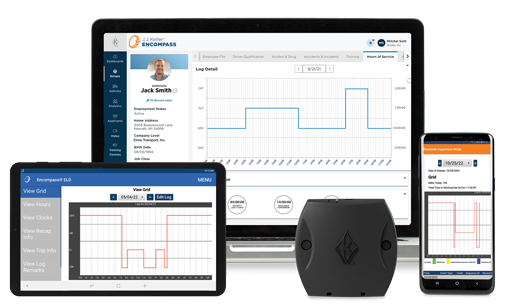Sr. Industry Business Advisor — J. J. Keller & Associates, Inc.
The Truth About ELD Mandate Exemptions
Whether good or bad, not everyone has to play by the same rules. That’s true for carriers regulated by FMCSR's.
Published On: 04/10/2017


Written by:
Tom Bray
Whether good or bad, not everyone has to play by the same rules.
That’s especially true for carriers regulated by Federal Motor Carrier Safety Regulations, which set minimum standards for safe truck and bus operations, yet include a growing list of exemptions for specific types of drivers. While it’s natural to take advantage of available exemptions, using one improperly could have significant consequences.
Hours Of Service & Electronic Logging Devices
Exemptions from the federal Hours of Service (HOS) rules are perhaps the most widely used — and abused — of all exemptions. Using an HOS exemption improperly could lead to significant risk and liability for your operation, especially if one of your “exempt” drivers becomes fatigued and gets involved in an accident.
For some carriers, that risk could be growing due to the mandate for electronic logging devices (ELDs). Many carriers and drivers believe — or hope — they are exempt from needing ELDs, but that may not be the case.
In fact, relatively few commercial drivers will be exempt, but that’s not stopping a flurry of rumors and misconceptions about who has to comply and who doesn’t. Compliance depends on knowing the details.
ELD Exemptions
The electronic logging device mandate will affect roughly 3.5 million CMV drivers, but not allcommercial drivers will need to use ELDs. Some drivers will still be allowed to use paper logs or may be exempt from logs.
The federal HOS rules include the following exemptions from needing ELDs:
- Drivers who are exempt from the HOS rules entirely will continue to be exempt, such as government drivers and drivers of utility service vehicles.
- Drivers who are entirely exempt from logs will continue to be exempt, such as certain church-bus drivers and those who consistently use a short-haul 100/150-air-mile exemption.
- In-state-only (intrastate) drivers who are exempt from federal ELD rules by their state. Some states may grant additional exemptions for certain drivers who stay within the state.
- Drivers who only need logs infrequently, such as those using the 100- or 150-air-mile-radius exemptions, as well as “intermittent” or “occasional” drivers who simply do not drive very often. Those who need to use logs on 9 or more days in any 30 consecutive days will need to start using an ELD on the 9th day unless another exemption applies.
- Drivers operating in a “driveaway-towaway” operation (as defined in Section 390.5) in which the vehicle being driven is part of the shipment being delivered, such as manufacturers delivering vehicles to dealers, or dealers to buyers.
- Drivers of vehicles that were manufactured before model year 2000, since these vehicles were not required to have electronic control modules (ECMs) to which an ELD can connect. The vehicle ID number (VIN) is used to determine which vehicles qualify for this exemption.
- Finally, drivers who are using a compliant, automatic on-board recording device (AOBRD) by December 18, 2017, will not need to use an ELD until December 16, 2019. The extra two years allows extra time to make the device compliant with the ELD standards or to replace the device with an ELD.
Using ELDs Despite Exemptions
Motor carriers and drivers who are exempt from needing ELDs may choose to use them anyway. Why? There are several reasons:
Risk management. The Federal Motor Carrier Safety Regulations set minimum standards, but many companies choose to go “above and beyond” mere compliance to better manage risk. At least one FMCSA study revealed automated logs can cut Hours of Service violations in half and reduce a motor carrier’s overall crash rate by more than 10 percent. This translates into fewer accidents and injuries and reduced liability in the courtroom, because HOS compliance becomes a non-issue — rather than a major issue — during litigation. It also means a lower possibility of fines and penalties from the FMCSA and other enforcement agencies.
Managing risk through the use of ELDs also results in better CSA scores, improved safety ratings, and less chance you’ll be audited in the first place. Remember that CSA scores are based on a peer comparison, i.e., what your competitors are doing in terms of safety and compliance. If your competitors start using ELDs and cut their roadside HOS violations in half while yours remain constant, that will be reflected in your CSA scores, which could lead to lost business and unwanted attention from the FMCSA. If your violation rate is high and you’re audited as a result, you could face significant monetary penalties and an unfavorable safety rating, leading to additional lost business, increased insurance premiums, or even an out-of-service order.
Improved driver efficiency. With ELDs, drivers get to drive, not do HOS paperwork or math problems. Drivers can also do a better job of planning, especially when they always know how much time is available.
Improved administration. ELDs provide useful data that can be used to your advantage for administrative purposes. This includes better and easier:
- Load and route planning
- Control over drivers’ hours and out-of-route miles
- Distribution of workload
- Administration of waiting time
- Log auditing
- Claims investigation
- Asset tracking, servicing, and idle control
- Reporting for fuel taxes (IFTA) and the International Registration Plan (IRP)
- Assessorial fee remittance, by substantiating driver detention
Equal treatment for all. Simply treating all drivers equally has its advantages as well. Having some drivers using ELDs, some using paper logs, others using time records, and perhaps some exempt from logs can be an administrative nightmare. Installing ELDs in all vehicles for all drivers reduces confusion when drivers switch vehicles, simplifies the process of maintaining and auditing their logs, and allows you to take advantage of all the other ELD benefits mentioned above, for all your drivers.
Know the Risks
There are many ways to be exempt from one or more requirements in the Federal Motor Carrier Safety Regulations, but there are just as many ways to misuse an exemption and add unnecessary risk to your operations. If you want to take advantage of an exemption, make sure it applies and you’re using it properly.
You may also enjoy the following articles:
Sign up for our newsletter!
We'll help you stay on top of regulations, best practices, and fleet industry news. Sign up to receive a monthly email notification with links to our most recent blog articles, free resources, and event invites.
